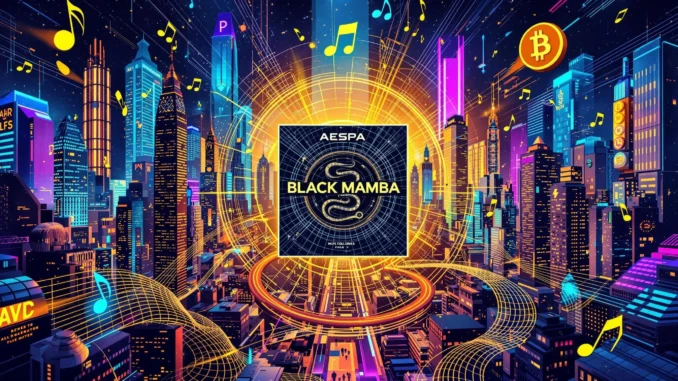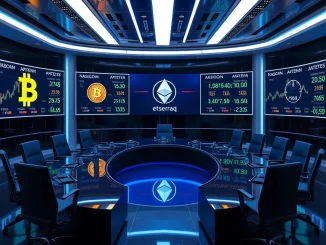
Get ready for a groundbreaking fusion of K-pop and crypto! Imagine owning a piece of your favorite song, directly supporting the artists you love. This isn’t just a dream anymore. Aria, a pioneering Real-World Asset (RWA) protocol, is making waves in the music industry by tokenizing music rights, and their latest acquisition is set to electrify the K-pop world. They’ve just announced securing partial rights to Aespa’s iconic debut track, ‘Black Mamba,’ with plans to bring these rights onto the blockchain. Let’s dive into how this exciting development is reshaping the landscape of music ownership and fan engagement.
What is Aria and Why is Tokenizing Music Rights a Game Changer?
Aria operates within the Story (IP) ecosystem and focuses on bringing Real-World Assets (RWAs) onto the blockchain. But what exactly are RWAs, and why is Aria’s approach so innovative, especially when it comes to music rights?
Real-World Assets are essentially tangible or intangible assets from the traditional world – think real estate, commodities, and in this case, intellectual property like music rights – that are represented digitally on a blockchain. Tokenization is the process of converting these rights into digital tokens on a blockchain, making them more accessible, divisible, and tradable.
Here’s why tokenization is a game-changer for music:
- Democratization of Ownership: Traditionally, music rights are complex and held by labels and publishers. Tokenization allows for fractional ownership, opening up investment opportunities to a wider audience, including fans.
- Enhanced Transparency and Efficiency: Blockchain technology provides a transparent and immutable record of ownership, streamlining royalty distribution and reducing administrative overhead.
- Direct Artist Support: Tokenization can create new revenue streams for artists, allowing them to connect directly with their fanbase and potentially bypass traditional intermediaries.
- New Forms of Fan Engagement: Owning a piece of music rights can deepen fan engagement, offering unique experiences and potentially governance rights related to the music.
Aria’s Expanding Music Empire: From BTS to Blackpink to Aespa
Aria isn’t new to the blockchain music scene. They’ve already made headlines with the successful tokenization of a hit single by global superstars BTS. This initial foray into the market proved the viability and excitement surrounding blockchain-based music ownership. Now, Aria’s music asset library boasts an impressive 90 prominent tracks, featuring music from international sensations like Blackpink and Justin Bieber.
The acquisition of partial rights to Aespa’s debut song ‘Black Mamba’ is a significant step forward. Aespa, known for their innovative concept and metaverse-inspired music, is a perfect fit for the cutting-edge world of crypto and tokenization. ‘Black Mamba,’ their powerful debut track, resonated globally, and now, a portion of its rights is entering the crypto space, bridging the gap between K-pop and decentralized finance.
How Does Tokenizing Aespa’s ‘Black Mamba’ Benefit Fans and the Music Industry?
The move to tokenize partial rights to ‘Black Mamba’ opens up a world of possibilities. Let’s explore the potential benefits for different stakeholders:
For Fans:
- Become a Music Stakeholder: Imagine owning a piece of ‘Black Mamba’ and directly benefiting from its success. Tokenization makes fans active participants in the music ecosystem.
- Exclusive Access and Experiences: Token holders might gain access to exclusive content, behind-the-scenes material, or even participate in decisions related to the music in the future (depending on the specific token structure).
- Potential Investment Opportunity: Music rights tokens could appreciate in value based on the song’s popularity and continued use, offering a potential investment avenue for fans.
- Deeper Connection with Artists: Tokenization fosters a stronger bond between artists and fans, moving beyond passive consumption to active participation and shared ownership.
For the Music Industry:
- New Revenue Streams: Tokenization can unlock new revenue streams for artists, labels, and publishers, diversifying income beyond traditional models.
- Increased Transparency and Efficiency: Blockchain’s inherent transparency can streamline royalty collection and distribution, reducing disputes and delays.
- Innovation and Modernization: Embracing blockchain technology positions the music industry at the forefront of innovation, attracting a new generation of tech-savvy fans and investors.
- Global Reach and Accessibility: Blockchain is borderless, enabling music rights to be accessible and tradable globally, expanding the potential market.
Navigating the Challenges of Music Rights Tokenization
While the potential of music rights tokenization is immense, it’s important to acknowledge the challenges and considerations that need to be addressed:
- Regulatory Landscape: The legal and regulatory framework for tokenized assets is still evolving globally. Clarity and compliance are crucial for widespread adoption.
- Valuation and Liquidity: Establishing fair valuation mechanisms for music rights tokens and ensuring sufficient liquidity in the market are essential for investor confidence.
- Education and Adoption: Educating both artists and fans about the benefits and complexities of tokenization is necessary for mainstream adoption.
- Copyright and Legal Complexities: Navigating existing copyright laws and ensuring proper legal frameworks for tokenized rights is critical to avoid disputes and ensure artist protection.
The Future is Tokenized: What’s Next for Music and Blockchain?
Aria’s move to tokenize partial rights to Aespa’s ‘Black Mamba’ is more than just a news story; it’s a powerful signal of the evolving relationship between music, technology, and ownership. As blockchain technology matures and the crypto space expands, we can expect to see even more innovative applications in the music industry.
Imagine a future where:
- Artists directly tokenize their own music rights, building communities around their work and rewarding early supporters.
- Fans can easily discover, invest in, and trade music rights tokens from their favorite artists globally.
- Decentralized Autonomous Organizations (DAOs) are formed around music projects, allowing token holders to participate in governance and decision-making.
- New forms of interactive and immersive music experiences are created, powered by blockchain and tokenization.
Conclusion: A New Era for Music Ownership is Dawning
Aria’s acquisition and planned tokenization of partial rights to Aespa’s ‘Black Mamba’ marks an exciting leap forward in the music industry. It’s a testament to the power of blockchain to disrupt traditional models and create new opportunities for artists and fans alike. By bridging the gap between K-pop’s global appeal and the innovative world of crypto, Aria is paving the way for a future where music ownership is more democratic, transparent, and engaging. Keep an eye on this space – the revolution in music rights is just getting started, and it promises to be a captivating symphony of technology and artistry.



